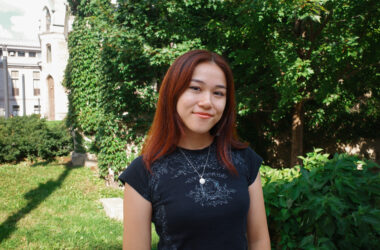Before I left for my exchange term at the University of Edinburgh last winter, I sat in Leacock 132, half-listening to a mandatory safety presentation, when one line caught my attention: “This is going to be the best five months of your life.” The idea terrified me: I was by no means hoping to peak at 20. Still, there was a part of me that wanted to believe this fantasy. Only two months later, I found myself sitting on the edge of my squeaky twin bed at four a.m., jet-lagged and teary-eyed, praying that the presenter was just being hyperbolic.
When I first settled in Edinburgh, I wasn’t consumed by excitement or post-arrival jitters. Instead, I felt an overwhelming pressure to have “the greatest time of my life,” without being entirely sure what that entailed. I spent my hours of free time in the middle of the night, courtesy of jet-lag, reading personal essays written by students claiming that studying abroad was life-changing. I scrolled through my fellow travellers’ polished Facebook albums of far-off places. From my late-night research, I deduced that, for everyone else, exchange was as exhilarating and wondrous as advertized. I felt obligated to live a similarly exciting, adventurous, and problem-free existence during my own exchange term, and was disappointed in myself for failing to do so.
Adjusting to my new and temporary life in Edinburgh was difficult. Yes, I spent time exploring the city, meeting new people, planning adventures, and traveling around the countryside. But, I also navigated a foreign healthcare system with a fever, slept on suspect mattresses in derelict hostels, and spent many nights alone in my bedroom. Though I had predicted the early adjustment period would be a challenge, nearly half-way through my program, I was still nostalgic for my familiar life back at McGill, and felt isolated without my usual support networks. At a particularly sensitive moment, I found myself welling up after receiving a Facebook invitation to an event in Montreal, and I lamented giving up a comfortable semester back at McGill. Every time I expressed frustration and defeat, I worried that I would come across as unappreciative to people back home, and I was concerned that I was not taking advantage of all the opportunities available to me.
Things did become easier over time. I became more content spending time alone, and Edinburgh became less foreign to me. Ultimately, I have come to appreciate that my bouts of vulnerability and loneliness were just as formative as my other adventures abroad. I expected to have the best time of my life while still achieving some sort of personal growth, but these ambitions were incompatible: It would be impossible to challenge myself without facing any obstacles. In the absence of close friendships, I ventured to become more independent, and, by the end of the semester, undertook a solo trip to the west coast of Scotland.
Was my exchange term in Edinburgh the best five months of my life? I hope not. In fact, I have never felt more relieved to return to a recognizable routine as the moment my plane touched down in my hometown of Chelsea, New York. But, when I reminisce with people back home about my travels, the hardships fade to the background, and I find myself feeling a little nostalgic for Edinburgh’s grey skies and my solo adventures.









